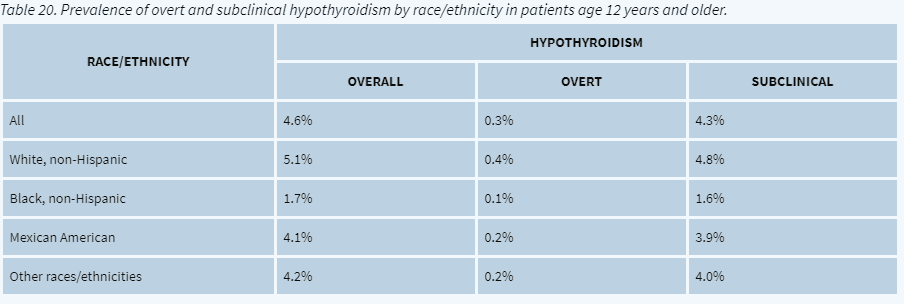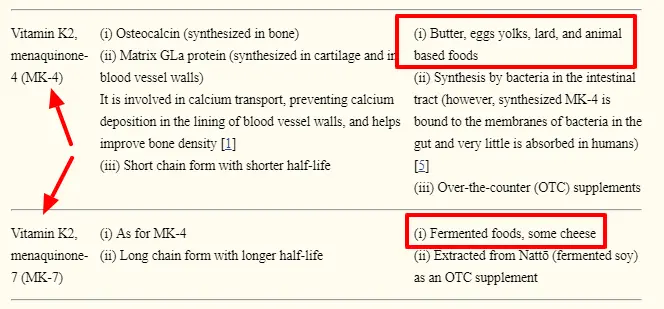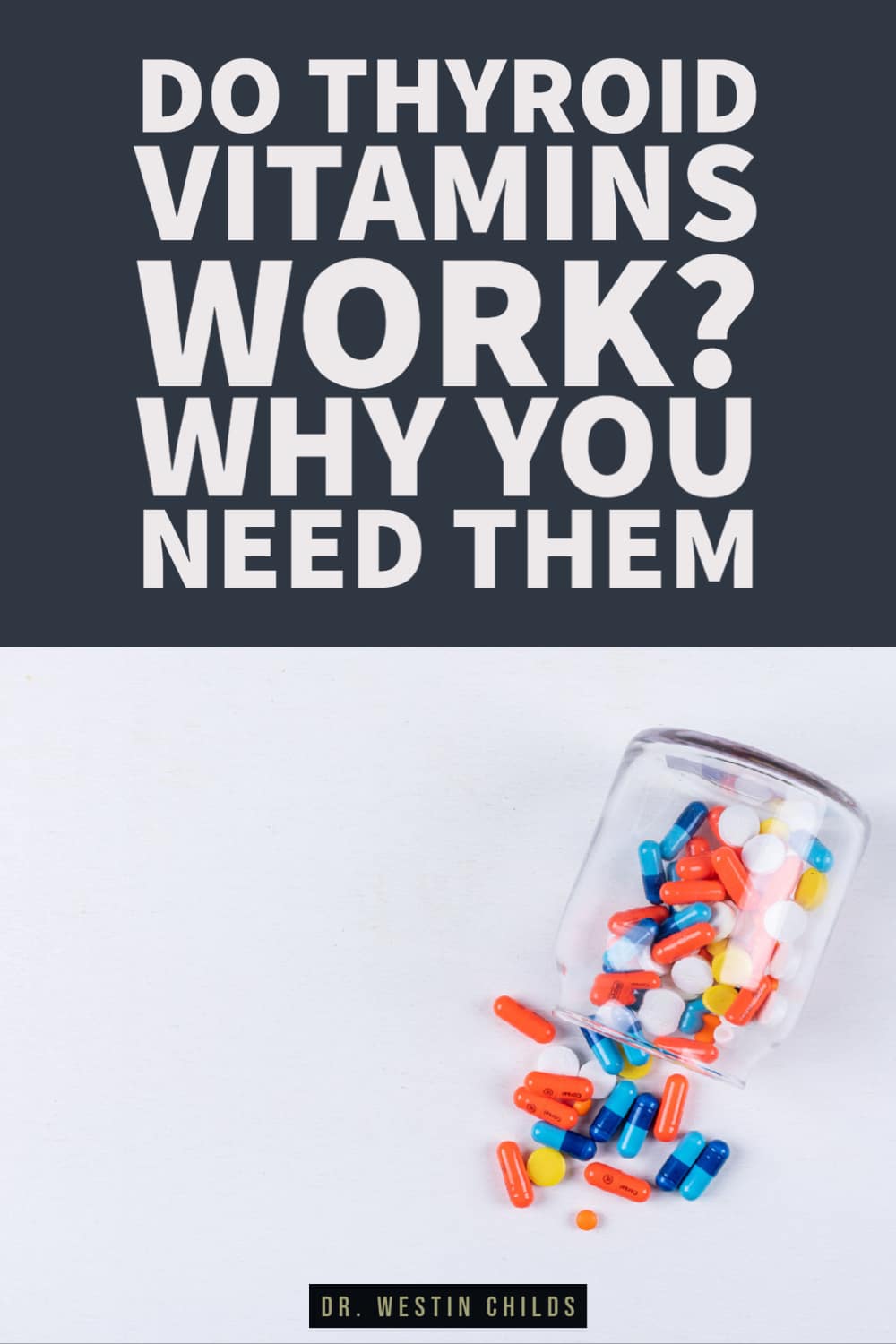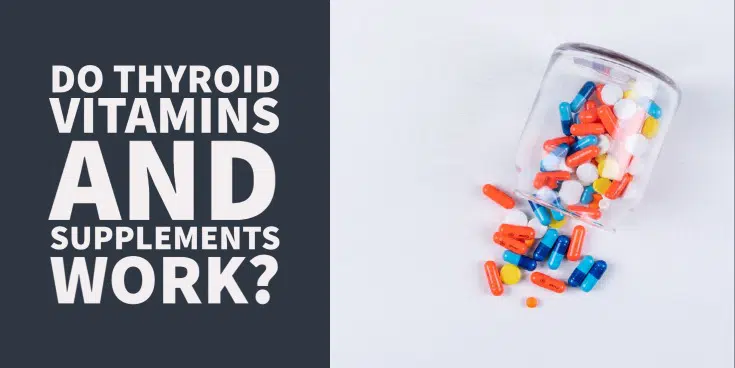With more than 20 million people who have hypothyroidism (depending on which study you look at (1)) in the United States, you might have asked yourself at some point whether or not you should use vitamins directed at your thyroid.

You wouldn’t be alone in asking this question which is why we are going to take a deep dive into that exact topic today.
You will learn whether or not thyroid vitamins actually help your thyroid, if they are safe, which ones can be harmful, when you should consider using them, and more.
*Disclosure: I sell my own thyroid supplements/vitamins but I’m still going to write this article from an unbiased standpoint my general opinion is that thyroid supplements can help but they may not be the answer you are looking for.
Will Taking Thyroid Vitamins Actually Help your Thyroid?
As a physician who has used vitamins and supplements to augment therapies in hundreds of thyroid patients, I can confidently say that there are many of you out there who could benefit from the use of these vitamins.
Having said that, we need to get specific when we talk about what types of benefits you should expect (or not expect) if you decide to use them.
For instance:
Is it likely that taking thyroid vitamins will suddenly help you feel back to your own self, help you get off of thyroid medication, and help you lose weight?
No, probably not.
Don’t get me wrong, this can happen, but it’s not common.
But you probably knew that already or you wouldn’t be reading something like this, to begin with.
So, how can thyroid vitamins help if not in the way that I described above?
Thyroid vitamins, if used correctly in the right dosages and formulations, may help you feel somewhat better but they are not a replacement for your existing thyroid medication (if you are taking any).
This occurs because the severity of thyroid disease varies from individual to individual.
Those people with more severe thyroid disease, those people with obvious nutrient deficiencies, and those people who have not been eating healthy are more likely to benefit when using thyroid vitamins.
This doesn’t mean that they won’t help you if you don’t fit into those categories but you should have a realistic expectation of what they can do before you take them.
In my experience, thyroid vitamins are better thought of as an existing SUPPLEMENT to whatever you are currently doing.
If you are taking thyroid medication already then they can be an extra tool you can use to augment that therapy.
Already eating healthy? Great, get some extra nutrients with these vitamins.
Already exercising, sleeping well, and reducing your stress? Great, certain vitamins can help these therapies be more effective as well.
The main point here is to look at vitamins as supplements to whatever you are already doing.
Don’t assume that you can stop taking your thyroid medication just because you are about to start a highly-rated thyroid vitamin.
DOWNLOAD FREE RESOURCES
Foods to Avoid if you Have Thyroid Problems:
I’ve found that these 10 foods cause the most problems for thyroid patients. Learn which foods you should avoid if you have thyroid disease of any type.
The Complete List of Thyroid Lab tests:
The list includes optimal ranges, normal ranges, and the complete list of tests you need to diagnose and manage thyroid disease correctly!
But… Will They Hurt You?
Perhaps more important than whether or not taking thyroid vitamins are helpful is whether or not they are harmful.
It would be one thing to take a vitamin hoping for a positive reaction only to see very little to no noticeable improvement in your symptoms.
It would be another thing to actually feel WORSE when taking your supplements and to do damage to your thyroid in the process.
Is this a real possibility for many of you out there?
The truth is that there may be some risks when taking over-the-counter vitamins but these risks are very small and can be mitigated to almost zero percent if done correctly.
There is a big difference between purchasing supplements from an overseas company where vitamins and supplements are not regulated and purchasing supplements from a reputable United States vendor which is TGA (2) and NSF certified (3).
If you’ve heard any horror stories from people who have tried thyroid supplements with seemingly devastating side effects then I would wager that those supplements were purchased from a place that isn’t regulated.
And these vitamins can definitely cause issues because they sometimes contain active thyroid hormones. You know, the same hormones which are found in your thyroid medication!
Again, this sort of stuff really only happens when they are purchased from oversea’s because the FDA heavily regulates prescription medications and formulas in the United States.
But what about just plain old negative reactions to supplements, do they occur as well?
And the answer to that is yes.
Let’s say that the vitamins you are purchasing do not contain any harmful ingredients, they are “pure”, and they have been properly stored, manufactured, and shipped.
How likely is a vitamin which falls into this category to cause negative symptoms in the average person?
The exact answer to that is unknown, but I can tell you from my own experience in providing over 10,000 supplements to thyroid patients that this does occur to a small percentage (probably 1-3% or so) of people who take over-the-counter thyroid vitamins.

While this risk is small it’s still something that you should be aware of before you purchase these supplements.
Why do these symptoms occur?
It probably has to do with many different variables including taking supplements your body may not need or taking higher doses of nutrients than you actually need.
But, perhaps counterintuitively, negative side effects are not always a bad thing.
In fact, they may be a sign that your body is adjusting to the new dose/vitamin or that you are having a detox-like reaction.
Remember:
Your body sequesters certain compounds, including endocrine disruptors, in your fat cells (4), and when they are flushed from your system they can still cause symptoms before they are completely eliminated.
Nutrient Deficiencies May not Always be Obvious
In a perfect world, you would only want to use vitamins if you felt that you had some need to use them.
For most of you, that would mean that you have some deficiency in the vitamins that you want to take.
But how common are these deficiencies? And what happens if you take nutrients that you are deficient in?
It might surprise you to know that even in our developed world, with an abundance of food and education at our fingertips, nutrient deficiencies still run rampant.
Consider these examples:
- Up to 40% of hypothyroid patients may be B12 deficient (5)
- Up to 30-50% of people may magnesium deficient (6)
- Up to 40-50% of people may be Vitamin D deficient (7)

These numbers are actually astonishingly high and hopefully, they surprise you at least a little bit.
These are obviously outliers in the sense that other nutrient deficiencies are probably not quite as common but the fact that these deficiencies are so prevalent should make you question your own nutrient status.
These numbers, by the way, only count those people who are GROSSLY deficient and not those who have only minor (or potentially sub-clinical) deficiencies.
If you include those numbers then I imagine we are looking at a large portion of even people in the United States who could benefit from vitamin supplementation.
And this makes sense if you look at the number of people who use vitamins as the most recent estimates say that up to 86% of the population of the United States use vitamins in some form (8).
Do you think that the people who are deficient in these nutrients know that they are?
Probably not.
Sometimes these deficiencies cause only minor issues such as mild fatigue or mild depression.
Obviously, these symptoms are still a problem but they may not be big enough to bring you to your doctor to get evaluated.
I bring this up to you as the thyroid patient to help you understand that even if you aren’t experiencing huge swings in your symptoms that doesn’t necessarily mean that your nutrient status is “fine”.
Even though nutrient testing can be inaccurate it’s still a good idea to get evaluated with simple blood tests if you suspect that you are deficient (or if you just want to be sure).
Vitamins vs Botanical Ingredients
When we talk about vitamins we also need to distinguish between vitamins and other nutrients found in thyroid supplements such as botanical ingredients.
Vitamins fall into a class of their own but they are often mixed with other botanical ingredients.
Botanical ingredients are plant-based compounds that have been extracted
This is typically done because people experience better benefits when taking the combination of vitamins plus botanicals.
Many of my supplements contain this exact same formula and the reason is that they work.
The only potential downside to this is that some res
Botanical ingredients found within thyroid vitamins include things such as:
- Adrenal adaptogens – Adaptogens include ingredients such as ashwagandha, Rhodiola, holy basil, ginseng, and so on.
- Guggul extract – Guggul extract is plant-based and has been shown to improve thyroid function in some studies.
- Anti-inflammatory agents – Agents such as fish oil (not plant-based but animal-based), CLA, and ALA are not necessarily “vitamins” but still help the body by causing other important effects.
- Anti-oxidant agents – Polyphenols (9) (from fruit), alpha lipoic acid, berberine, etc. would all be examples.
Vitamins are obviously vitamins because they contain vitamins in the name!
Just so we are on the same page, though, this would include things like Vitamin A, C, D, E, B (all of them), and so on.
The way that vitamins work in your body is different from the way that botanical ingredients do.
Botanicals tend to impact your physiology whereas vitamins tend to allow everything to work more efficiently (because these vitamins are necessary for function acting as co-factors in many enzymatic reactions).
When you look at thyroid vitamins be sure to see what type of ingredients you are actually taking because they can influence how you feel/what you feel.
You will need to figure out if botanicals or extra ingredients are ideal for you.
Are Vitamins Superior to your Thyroid Medication?
The answer to this is definitely no.
Thyroid vitamins play a completely different role compared to thyroid medication.
Prescription thyroid medications, such as levothyroxine, Synthroid, and NDT, contain ACTIVE thyroid hormones.
These prescriptions are given to REPLACE the thyroid hormone that your body is not producing.
Thyroid vitamins can potentially help to enhance or improve the production process and thyroid conversion process but they do not fulfill the same role as prescription medications.
This is good in the sense that they make a perfect pair to use together (provided you take them apart from one another) but bad in the sense that I know some of you out there hope that you can get off of thyroid medication by taking thyroid vitamins.
While this can potentially happen it really isn’t a likely outcome for the vast majority of you reading this.
Some of you might find, however, that replacing lost vitamins and nutrients through supplementation may reduce the amount of thyroid medication that you need.
This is particularly true if you are someone who has a reversible form of hypothyroidism caused by things such as iodine deficiency, early Hashimoto’s, inflammation, or recent weight loss.
Getting Nutrients from Food vs Over-the-Counter Supplements
Even though I am a huge proponent of using over-the-counter vitamins and supplements, I still recommend that you try to get as many nutrients and vitamins directly from your diet.
Whenever possible, the “natural” way is usually the best way.
There are two problems with this approach, however, worth mentioning here:
#1. Even if you are eating healthy it may not be possible to obtain the right amount of nutrients from diet alone.
Due to nutrient depletion of the soil (10), and other important factors, it can actually be quite difficult to obtain the right nutrients at the right dose to sustain your body.
Is it possible? Yes.
Is it difficult? Yes.
Obtaining proper amounts of nutrients such as selenium and iodine, for instance, are found in high amounts in certain foods.
If you are not eating these foods on a weekly or near-daily basis then you may be missing out on these important nutrients.
Iodine, for instance, is primarily found in sea vegetables like seaweed (11). It is also found in iodinated salt but many people prefer to use salts such as Celtic sea salt or Himalayan pink salt which typically do not contain iodine.
In addition, certain foods which you may not respond well to, such as dairy, contain high amounts of vitamins such as K2 (12).

If you remove dairy from your diet, because many people with thyroid issues react negatively to dairy, then you may limit the amount of K2 that your body needs.
The moral of the story is that eating healthy is not always sufficient for obtaining the nutrients that your body needs simply due to food restrictions, soil depletion of nutrients, and food preferences.
#2. Even if you are eating a healthy whole foods diet you may not be able to replace deficiencies which are already existing.
Imagine that you have extremely low vitamin b12 levels or low iron levels (both of which can negatively impact your thyroid).
Because of this, you decide to increase your consumption of red meat to try and fight this the natural way.
Despite eating these foods more frequently, you still find that both your iron and B12 are still low several months later.
What happened?
Sometimes it isn’t possible to physically absorb the nutrients you need even if you are consuming the right type of foods.
Because of this, eating healthy tends to be better at PREVENTING nutrient deficiencies but it may not be sufficient to replete low levels of certain nutrients.
In cases such as these, you would want to eat healthy while also supplementing.
Can I get my Vitamins from Walmart or Target or another convenience store?
Technically, you definitely can.
But I probably wouldn’t recommend it.
And I certainly wouldn’t recommend that any of my family members or the patients that I treat get them from a place such as that.
How come?
Much like virtually everything else in life, quality is a factor you should consider when you purchase anything.
Have you ever purchased a knock off product from Amazon because it was cheaper than the regular name-brand product you were initially interested in?
If so, then you probably know what I am talking about.
The reason the cost is less has to do with the manufacturing process, the quality of the ingredients of each portion of the product, the way it is shipped, and so on.
All of these things improve the overall value of the product that you are purchasing.
And this same thing exists in the supplement world except I would argue that it’s even more important.
Why?
Because if you get it wrong then the outcome may be negative for your health and result in either no positive benefit or a net negative experience.
This may not make sense until you understand that there are many variations of the exact same vitamin and these variations in how they are formulated and processed impact how well they are absorbed, how well they are utilized in your body, and whether or not they will even have an impact.
Take something simple like Vitamin B12.
Vitamin B12 comes in many formulations, but the cheapest formulation (Cyanocobalamin) is not ideal for approximately 40% of people who have MTHFR mutations (13).
These mutations impact how likely your body is to be able to utilize the B12 that you are taking.
If you get your B12 in another form, such as methylcobalamin, you can bypass the mutation and get the benefits of the vitamin.
But, the difference in this formulation increases the price due to the extra steps it takes to produce.
This is why you can find incredibly cheap versions of B12 in places like Walmart but it doesn’t mean that they will work!
Not only this, but major retailers are less likely to ship, store, and manufacture your vitamins correctly which leads to diminished results for the people who purchase them.
This isn’t true for all types of vitamins or supplements but it happens enough that I honestly wouldn’t recommend purchasing them from a place such as Walmart or Target or Costco.
Conclusion
Do thyroid vitamins work?
I think we’ve come to the conclusion that the answer to this question is actually a little more complicated than just a yes or a no.
In many cases, however, thyroid vitamins can potentially be beneficial to those who use them.
But, even in these cases, you need to have the right expectations.
Expecting your vitamins to completely improve your thyroid situation may not be realistic.
But using them to help augment your existing therapies and even your existing thyroid medication is definitely possible.
In terms of WHICH supplements you should use for your thyroid, I would direct you to this detailed guide.
This guide walks through the 10 most common nutrient deficiencies found within hypothyroid patients and explains the symptoms associated with each of these and how to determine if you should be supplementing or not.
Now I want to hear from you:
Are you currently using vitamins to support your thyroid?
If so, which ones are you using?
Do you feel that they are “working” for you?
If so, how are they making you feel?
Leave your questions or comments below!








